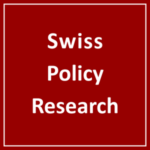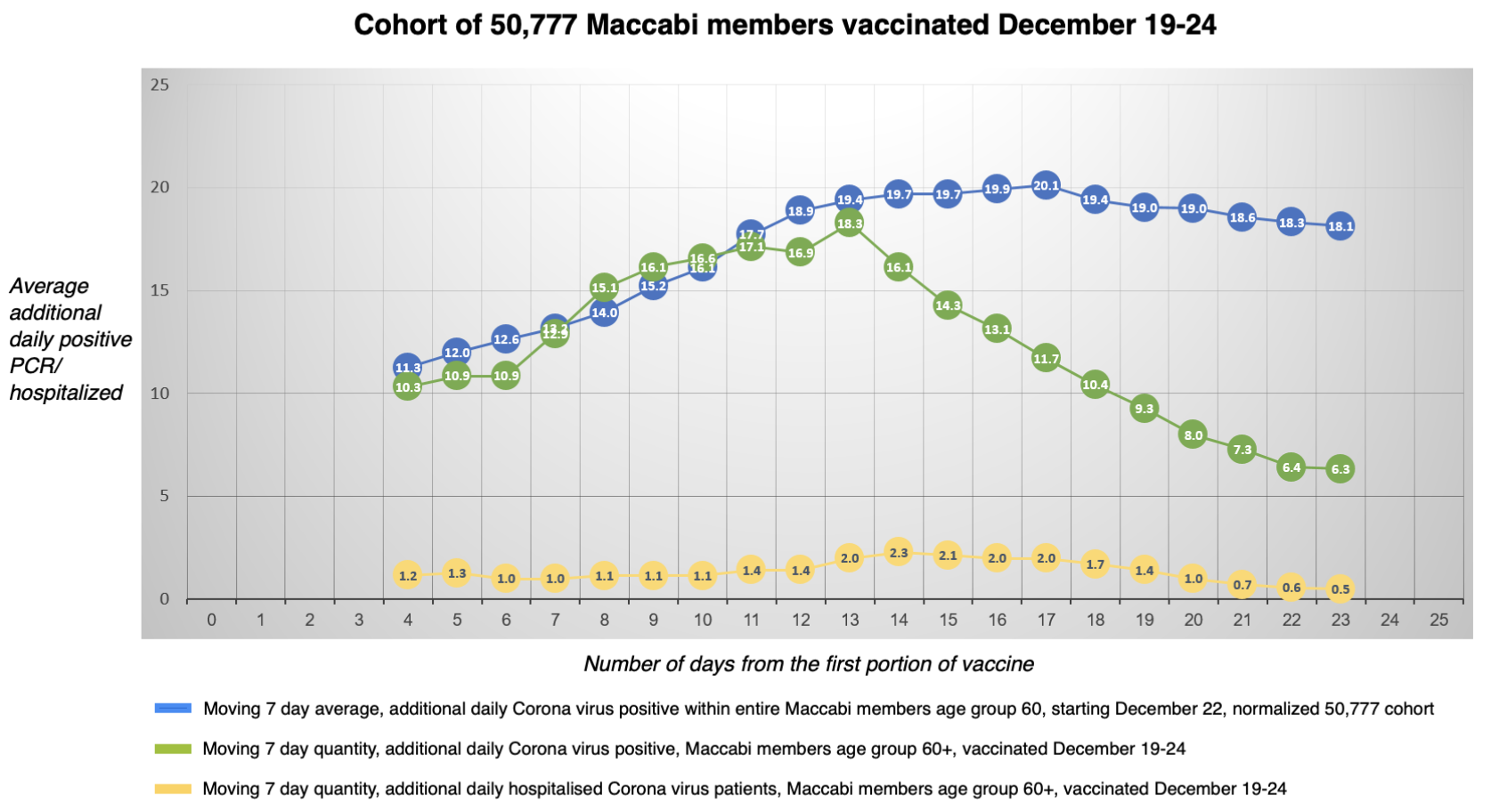Coronavirus Vaccine Update
COVID19 - CORONAVIRUS, 25 Jan 2021
Swiss Policy Research - TRANSCEND Media Service
Israel: Impact of vaccine on infections and hospitalizations in citizens 60+ (Maccabi)
**************
An Update on Real-World Coronavirus Vaccine Effectiveness and Safety Results
23 Jan 2021 – Vaccines may, and hopefully will, play an important role in ending the current coronavirus pandemic, but they are also associated with some uncertainties and risks, especially if new and experimental technologies are involved, such as the messenger RNA technology.
Peter Doshi, associate editor at the British Medical Journal BMJ, noted in a recent analysis that the coronavirus vaccine trials left important questions unanswered, in particular regarding vaccine effectiveness in senior citizens, i.e. the main covid risk group. For instance, Doshi noted that the Pfizer vaccine trial excluded over 3000 ‘suspected covid-19 cases’ (cases without PCR confirmation), and that this exclusion was done not by an independent panel, but by Pfizer employees.
The current world-leader in coronavirus vaccine rollout is Israel, which has already vaccinated about 25% of its population (i.e. more than 2 million people), including most of its senior citizens: among citizens 60+, about 80% have received their first dose and 30% have received their second dose.
Nevertheless, Israel has not yet seen a drop in nationwide infections or hospitalizations. Rather, more than 12,000 citizens got infected after receiving their first vaccine dose, which doesn’t provide immediate and full protection. Moreover, about 20% of currently hospitalized patients had already received their first vaccine dose, while daily infections are at an all-time high.
But Israeli researchers estimate that the infection rate in vaccinated citizens is already 30% to 60% lower than in unvaccinated people, and they hope to see a significant reduction in hospitalizations by February. One of the major Israeli healthcare providers reported that infection and hospitalization rates among the 50,000 citizens who had received their first vaccine dose in mid-December are already down by about 60%, which is very encouraging news indeed (see chart above).
Regarding side effects and adverse events, globally, there are some reports of rare serious allergic or neurological events, and in some cases even deaths, related to the vaccines or vaccinations, especially after the second dose or in people who had already been infected. After about two dozen suspicious deaths in elderly people, Norway is now recommending against vaccinations in very frail elderly people over 80 years. But overall, based on current data, the vaccines appear to be quite safe, even though little is still known about their long-term safety and efficacy profile.
Regarding virus mutations, there are some first reports that certain mutations, notably the one from South Africa, may partially or fully escape antibodies from previously infected people. These people may still have some immunity (e.g. through T-cells), but some vaccine manufacturers, such as Oxford-AstraZeneca, are nevertheless preparing to ‘update’ their vaccines. At the same time, several airlines and other industries are discussing the introduction of ‘digital vaccine passports’, something civil rights and data privacy advocates have repeatedly warned of and spoken out against.
See also: Vaccines: Successes and Controversies
__________________________________________
 Swiss Policy Research, founded in 2016, is an independent, nonpartisan and nonprofit research group investigating geopolitical propaganda in Swiss and international media. SPR is composed of independent academics that for personal and professional reasons prefer to protect their identities, and receives no external funding; there are no financial sponsors or backers. Our articles have been published or shared by numerous independent media outlets and journalists, among them Julian Assange, and have been translated into more than two dozen languages.
Swiss Policy Research, founded in 2016, is an independent, nonpartisan and nonprofit research group investigating geopolitical propaganda in Swiss and international media. SPR is composed of independent academics that for personal and professional reasons prefer to protect their identities, and receives no external funding; there are no financial sponsors or backers. Our articles have been published or shared by numerous independent media outlets and journalists, among them Julian Assange, and have been translated into more than two dozen languages.
Tags: COVID-19, Coronavirus, Pandemic, Vaccines
DISCLAIMER: The statements, views and opinions expressed in pieces republished here are solely those of the authors and do not necessarily represent those of TMS. In accordance with title 17 U.S.C. section 107, this material is distributed without profit to those who have expressed a prior interest in receiving the included information for research and educational purposes. TMS has no affiliation whatsoever with the originator of this article nor is TMS endorsed or sponsored by the originator. “GO TO ORIGINAL” links are provided as a convenience to our readers and allow for verification of authenticity. However, as originating pages are often updated by their originating host sites, the versions posted may not match the versions our readers view when clicking the “GO TO ORIGINAL” links. This site contains copyrighted material the use of which has not always been specifically authorized by the copyright owner. We are making such material available in our efforts to advance understanding of environmental, political, human rights, economic, democracy, scientific, and social justice issues, etc. We believe this constitutes a ‘fair use’ of any such copyrighted material as provided for in section 107 of the US Copyright Law. In accordance with Title 17 U.S.C. Section 107, the material on this site is distributed without profit to those who have expressed a prior interest in receiving the included information for research and educational purposes. For more information go to: http://www.law.cornell.edu/uscode/17/107.shtml. If you wish to use copyrighted material from this site for purposes of your own that go beyond ‘fair use’, you must obtain permission from the copyright owner.
Read more
Click here to go to the current weekly digest or pick another article:
COVID19 - CORONAVIRUS:
